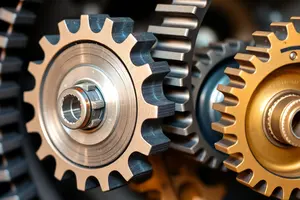Podcast
Questions and Answers
What is the purpose of mechanical drives?
What is the purpose of mechanical drives?
Mechanical drives are intended to transmit power over a certain distance.
What are the three types of mechanical drives mentioned?
What are the three types of mechanical drives mentioned?
Belt drive (friction), chain drive (engagement), and gears (engagement).
What is the advantage of gear drives?
What is the advantage of gear drives?
Gear drives transmit power by means of successive engagement of teeth, resulting in a constant velocity ratio.
What is the center distance between gears in gear drives?
What is the center distance between gears in gear drives?
What provision can be made in the gearbox of gear drives?
What provision can be made in the gearbox of gear drives?
What are the salient features that dictate a selection of explicit/implicit time integration schemes?
What are the salient features that dictate a selection of explicit/implicit time integration schemes?
Obtain expressions for order of accuracies in space and time with the help of Taylor series expansions.
Obtain expressions for order of accuracies in space and time with the help of Taylor series expansions.
Why are indirect methods used to solve a system of linear equations in CFD?
Why are indirect methods used to solve a system of linear equations in CFD?
Provide the expressions for Jacobi-iteration and Gauss-Seidel to compute an update of O variable.
Provide the expressions for Jacobi-iteration and Gauss-Seidel to compute an update of O variable.
Among Jacobi-iteration, Gauss-Seidel and Gauss-Seidel successive over-relaxation (SOR) solvers, which is expected to perform fastest?
Among Jacobi-iteration, Gauss-Seidel and Gauss-Seidel successive over-relaxation (SOR) solvers, which is expected to perform fastest?
Flashcards are hidden until you start studying
Study Notes
Purpose of Mechanical Drives
- Mechanical drives are used to transmit power and motion from one component to another within machinery.
Types of Mechanical Drives
- Three types of mechanical drives include:
- Belt drives
- Chain drives
- Gear drives
Advantages of Gear Drives
- Gear drives offer high efficiency and compactness.
- They enable precise speed and torque modifications.
Center Distance in Gear Drives
- Center distance refers to the distance between the centers of two meshing gears.
Provision in Gearbox of Gear Drives
- Gearbox provisions can include adjustments to accommodate wear and fine-tuning for gear alignment.
Features Affecting Selection of Time Integration Schemes
- Salient features include:
- Stability and accuracy requirements
- Computational cost
- Type of problem being solved (e.g., stiff vs. non-stiff systems)
Order of Accuracies Using Taylor Series
- The order of accuracy can be derived from Taylor series expansions, highlighting the relationship between spatial discretization, time step size, and errors.
Use of Indirect Methods in CFD
- Indirect methods are employed to solve systems of linear equations in Computational Fluid Dynamics (CFD) due to their stability and efficiency for large, sparse systems.
Expressions for Iterative Methods
- Jacobi Iteration: ( x^{(k+1)}i = \frac{1}{a{ii}} \left(b_i - \sum_{j \neq i} a_{ij} x^{(k)}_j\right) )
- Gauss-Seidel Iteration: ( x^{(k+1)}i = \frac{1}{a{ii}} \left(b_i - \sum_{j < i} a_{ij} x^{(k+1)}j - \sum{j > i} a_{ij} x^{(k)}_j\right) )
Performance of Solvers
- Gauss-Seidel successive over-relaxation (SOR) is generally expected to perform the fastest among the three methods: Jacobi iteration, Gauss-Seidel, and Gauss-Seidel SOR solvers.
Studying That Suits You
Use AI to generate personalized quizzes and flashcards to suit your learning preferences.





